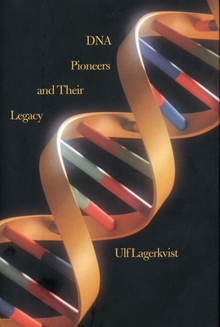DNA Pioneers and Their Legacy
WARNING
You are viewing an older version of the Yalebooks website. Please visit out new website with more updated information and a better user experience: https://www.yalebooks.com
Ulf Lagerkvist
In this entertaining account of the origins of modern molecular biology, the lives of pioneering scientists in the field of nucleic acid research, and the discovery of DNA, Ulf Lagerkvist speaks not only to scientists but to all students and general readers with an interest in science. The author, whose career in the nucleic acid field began in the late 1940s, recreates historical episodes from the nineteenth and early twentieth centuries and introduces for a modern audience the scientists whose discoveries revolutionized the field of biology. Knowledge of these pioneers as professionals and as human beings, Lagerkvist believes, may help us see modern problems in a new light and appreciate the greatness of the researchers who contributed to the foundations of molecular biology and biochemistry.
Among these scientific pioneers was nineteenth-century biochemist Friedrich Miescher, discoverer of nuclein, the material now known as DNA. The book also explores early research into general problems of the chemistry of biological materials. Lagerkvist vividly describes the research of such influential scientists as Albrecht Kossel, another early leading figure; Emil Fischer, who received the Nobel Prize in 1902 for his work on carbohydrates and purines and was regarded as the foremost chemist of his time; P. A. Levene, known for his discoveries concerning the structure of nucleotides and the way these nucleic acid building blocks are linked to one another; and Oswald T. Avery, often considered the grandfather of molecular genetics.
Among these scientific pioneers was nineteenth-century biochemist Friedrich Miescher, discoverer of nuclein, the material now known as DNA. The book also explores early research into general problems of the chemistry of biological materials. Lagerkvist vividly describes the research of such influential scientists as Albrecht Kossel, another early leading figure; Emil Fischer, who received the Nobel Prize in 1902 for his work on carbohydrates and purines and was regarded as the foremost chemist of his time; P. A. Levene, known for his discoveries concerning the structure of nucleotides and the way these nucleic acid building blocks are linked to one another; and Oswald T. Avery, often considered the grandfather of molecular genetics.
Ulf Lagerkvist is retired professor of the Department of Medical Biochemistry at the University of Göteborg, Sweden.
A selection of the Library of Science
ISBN: 9780300071849
Publication Date: June 16, 1998
Publication Date: June 16, 1998
168 pages, 5 1/2 x 8 1/4
33 b/w illus.
33 b/w illus.








